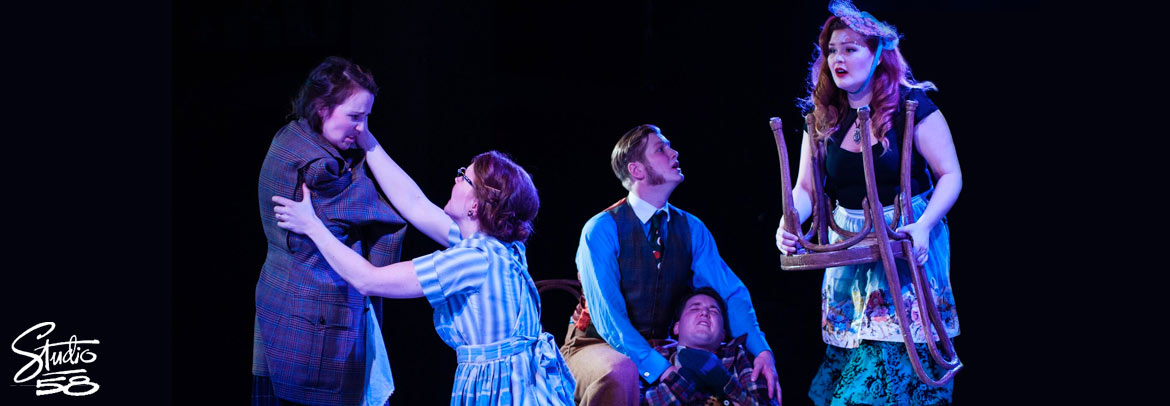THEATRE REVIEW
FEBRUARY 2018 | Volume 164

Wheaties. Photo: David Cooper.
THE SKIN OF OUR TEETH
by Thornton Wilder
Studio 58, Langara College
Feb. 1-18
$12.50-$25
www.studio58.ca or 604-684-2787
BUY TICKETS
I studied Thornton Wilder’s The Skin of Our Teeth in the first drama course I ever took, in second-year university in 1964. The Our Town playwright was still a star of the American theatre, and The Skin of Our Teeth, premiered in 1942, was a significant early work of the American absurd.
I’ve waited over 50 years to see a production of this odd metatheatrical humanistic post-apocalyptic comedy, but director Sarah Rodgers’ brilliantly eclectic vision, an A-list design team and the students of Studio 58 have made it worth the wait. The play has some renewed currency because of the ecological themes of its first two acts, but the production’s the thing over at Langara College.
Wilder wrote a comic-book allegory of human history underpinned with references to the Bible, Homer, Plato and Aristotle. We follow the Antrobus family—patriarch George (William Edward), wife Maggie (Mallory James), kids Gladys (Page Fraser) and Henry (Dan Swain), and their maid Sabina (Erin Palm)—as they face first a coming ice age (alongside a dinosaur and mammoths), then an apocalyptic flood, and finally some kind of post-war reconstruction.
There are suggestions that George (who has invented the alphabet, multiplication and the wheel) and Maggie are Adam and Eve, and angry, violent Henry is Cain. The second act takes place on the Atlantic City boardwalk where George has become President of the Mammals. Sabina, now Miss Atlantic City, attempts to break up his marriage as a dire storm approaches and animals begin to board the ark. The final act seems to imagine what might await the world if and when the Second World War ended.
Sabina regularly drops out of character and addresses the audience directly, Wilder probably anticipating and trying to circumvent what some of the original audience must have felt: “I hate this play,” she says. “I don’t understand a word of it!”
The somewhat obscure, often silly and always playful point seems to be that humankind is destructive and blind but also remarkably resourceful, creative and resilient.
Director Rodgers takes Wilder’s playfulness and just flies with it, using her large ensemble cast and the entire mise en scène to excellent effect. David Roberts’ set is absolutely inspired, a skewed, half-buried house, which the cast at intermission transform into the boardwalk, then rebuild again as the house. Rodgers stages the first and last acts on the roof, the house a kind of ark, though in the final act boards are torn from it, things fall through and pop out of it, and I was afraid an actor would take a misstep and break a leg—literally.
Sheila White’s 1930s-40s period costumes are equally sensational. Take a close look at the overlapping patterns and remarkable detail in what the second act’s two excellent fortune tellers (Jessie Liang and Taylor Long) are wearing. Emily Cooper’s mobile cartoon projections are a riot, and Itai Erdal’s lighting adds to the carnivalesque effect.
There’s live music throughout the show, framed as a radio broadcast, some composed by musical director Joelysa Pankanea, some period pop tunes and ad jingles. The Andrew Sisters-like Muses (Marguerite Hanna, Julia Muncs, Emily Jane King) sing in delicious harmony, and Evan Rein serves as a kind of one-man band, playing drums, guitar, horns and creating a range of delightful sound effects. The company swings to Shelley Stewart Hunt’s unobtrusive choreography.
Palm’s Sabina and James’ Mrs. Antrobus provide the standout performances. Edwards’ Mr. Antrobus is fine, but Wilder and Rodgers give these self-assured women centre stage, and they take it with aplomb. That feels more contemporary than any eco-themes the play might have.
get in touch with vancouverplays:
vancouverplays
Vancouver's arts and culture website providing theatre news, previews and reviews
